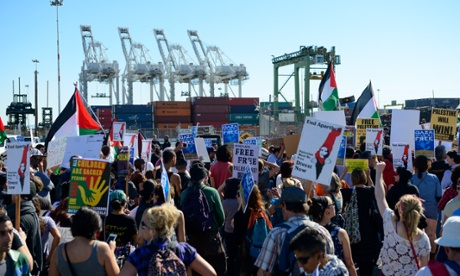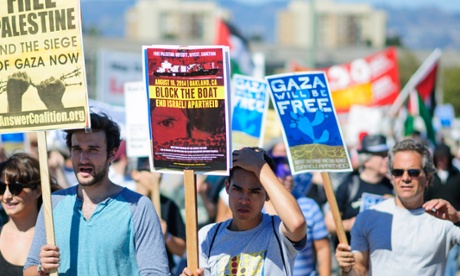
An Israeli ship that was scheduled to dock at the port of Oakland in California on Saturday remained at sea as between 2,000 and 3,000 pro-Palestinian activists streamed towards the port entrance, chanting and waving flags.
The protesters intended to form a picket line to prevent work crews from unloading the ship.
Activists had originally planned to meet at 5am for a blockade of the Zim Integrated Shipping Services vessel, but word that its arrival had been delayed prompted organisers to push the protest back until later in the afternoon.
The event began with a brief rally at a nearby transit station, followed by a march to the port. Sameh Ayesh, a 21-year-old Palestinian activist with the San Francisco-based Arab Youth Organisation, led the crowd in a chant.
“We’re gonna block the boat,” he called into a megaphone. “Block, block the boat.”
But before the march had even reached the port entrance, an activist who identified himself as Eyad delivered word that the Zim vessel would not be docking that day. An online ship tracking service showed that the vessel was off the coast of California, closer to Santa Cruz, as the march got under way.
Activists interpreted the delay as a victory since the schedule change seemed to have been made in response to the planned pickets. “We have stopped the Zim Piraeus from docking on the west coast of the United States,” said Eyad, of the Arab Resource and Organising Center (Aroc), into a megaphone, drawing cheers from the crowd as the march came to a halt on a bridge leading towards the docks.
“Zim Lines is the largest Israeli shipping company, and it’s a huge flow of capital for the state of Israel,” said Lara Kiswani, executive director of the centre, whose organisation was one of 70 to take part in planning the blockade.

Kiswani said the action was meant to generate momentum for a broader campaign calling for boycott, divestment and sanctions against the Israeli government as a response to violence in Gaza. “With the recent attacks on Palestine … there’s been a lot of discussion locally, particularly with Aroc, on how to escalate our tactics,” she said.
A similar blockade against a Zim vessel took place in 2010, when pro-Palestinian activists formed picket lines in response to Israel’s attack on a flotilla ferrying humanitarian outreach workers to Gaza. “After the flotilla was attacked by the state of Israel, we successfully were able to block the Zim Lines ship here, with the ILWU,” Kiswani said. “So for years we were working with ILWU, with rank and file, and with the leadership, to try and raise awareness about the plight of Palestinians.” In 1984, she added, “ILWU took a position against apartheid, and the workers refused to unload that ship”.
As the march reached the port entrance, where activists had originally planned to stage a picket, they encountered a line of police officers standing in formation. Protesters erupted into chants of, “hands up, don’t shoot!” – echoing chants sounded in response to police violence directed against street protesters in Ferguson, Missouri, in the wake of the fatal police shooting of 18-year-old Michael Brown.
Several others made statements linking recent acts of police brutality with the conflict in Gaza. “On Twitter, we’ve seen people in Gaza tweet to protesters in Ferguson how to cope with teargas,” said Mohamed Shehk, who helped organise the blockade with the Oakland-based nonprofit Critical Resistance. “They’re saying things like, ‘as Palestinians, we know what it’s like to be targeted and killed for being of the wrong ethnicity’.”
The Guardian is seeking comment from the port of Oakland and the Zim shipping company.

No comments:
Post a Comment